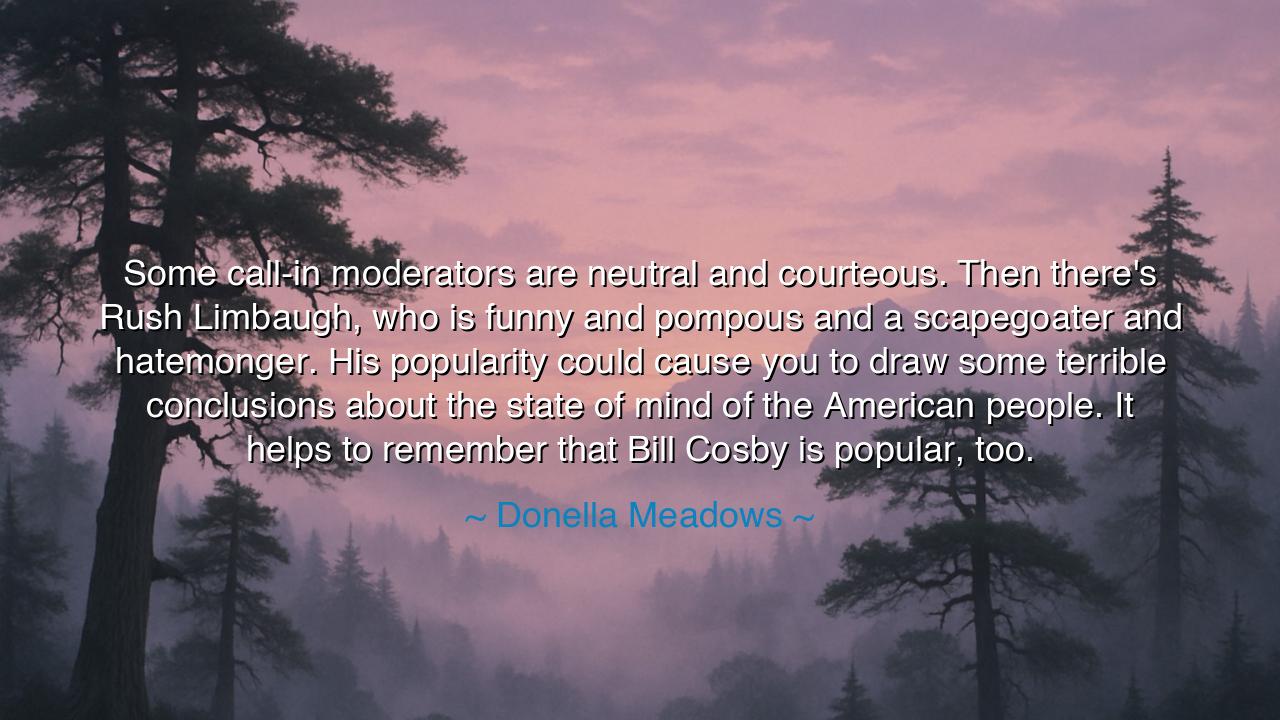
Some call-in moderators are neutral and courteous. Then there's
Some call-in moderators are neutral and courteous. Then there's Rush Limbaugh, who is funny and pompous and a scapegoater and hatemonger. His popularity could cause you to draw some terrible conclusions about the state of mind of the American people. It helps to remember that Bill Cosby is popular, too.






When Donella Meadows wrote, “Some call-in moderators are neutral and courteous. Then there's Rush Limbaugh, who is funny and pompous and a scapegoater and hatemonger. His popularity could cause you to draw some terrible conclusions about the state of mind of the American people. It helps to remember that Bill Cosby is popular, too,” she was not merely commenting on the culture of her time — she was offering a timeless meditation on the power of charisma, the danger of influence, and the complexity of human taste. Beneath her sharp observation lies a deep and paradoxical truth: that the masses often exalt those who speak to their passions, not their virtues; that the loudest voice is not always the truest, and that popularity, though dazzling, is not a measure of goodness.
The origin of this reflection rests in Meadows’ life as both a scientist and moral philosopher — a writer who sought to make sense of systems, not just in nature but in society. Writing during the rise of Rush Limbaugh, whose radio show defined a new era of political entertainment, Meadows saw with clarity how rhetoric, laughter, and anger could be woven together into a force of persuasion. She was fascinated and alarmed by how a man could be, at once, funny and dangerous — how humor could disguise hostility, and confidence could seduce reason. In her comparison to Bill Cosby, she made a point not of equivalence but of irony: that popularity itself is morally neutral, that the crowd’s applause can exalt both the healer and the hypocrite, the teacher and the demagogue.
The ancients understood this tension well. The philosopher Plato, in his dialogues, warned against the power of the sophist — the one who spoke with beauty but without truth. The sophist, like Limbaugh, could stir the hearts of listeners and fill their minds with conviction, yet his brilliance served not wisdom but domination. Socrates, who sought truth above victory, was condemned by a crowd swayed by rhetoric. Meadows, like Plato, saw that societies are often enchanted by voice and show, that eloquence without virtue can deceive the multitude. And yet, her tone is not despairing — for she tempers her warning with humor, reminding us that the human mind, though fallible, is still capable of laughter, still able to discern contradiction.
In her irony, there is compassion. When she says, “It helps to remember that Bill Cosby is popular, too,” she invites us to see humanity as a tapestry of contradictions. She knows that the same people who laugh at wisdom also laugh at cruelty, that the same nation that reveres art may reward arrogance. It is not a condemnation of the people, but a recognition of their complexity. Meadows saw that the soul of a culture cannot be measured by its idols alone, for beneath every loud voice there are still countless quiet ones — thinkers, dreamers, and healers whose influence ripples invisibly through time.
There is also a lesson here about the nature of charisma and truth. Charisma draws attention like fire, but truth is often a whisper. Limbaugh’s bombast captivated millions because he mirrored their frustrations and gave them shape — a phenomenon as old as civilization. In ancient Rome, the populist orator Clodius Pulcher stirred mobs with charm and anger, and for a time, Rome’s streets belonged to his followers. Yet history remembers not his jokes but the chaos he unleashed. So too, Meadows reminds us, must we beware of the voices that make us laugh while quietly hardening our hearts. Humor, when separated from empathy, becomes a weapon — sharp and glittering, but soulless.
Yet Meadows does not scorn laughter itself. She knew, as all wise teachers do, that humor is sacred when it heals. Her mention of Bill Cosby, then still regarded as a beacon of family comedy, served as a balance to Limbaugh’s rage — a symbol of how humor could be gentle, inclusive, and humane. But even this contrast is layered with irony, for in later years, Cosby himself would fall from grace, proving Meadows’ point all the more poignantly: that popularity is a mirror, not a measure, reflecting both the beauty and blindness of its age. The laughter of a culture reveals what it loves — and sometimes, what it refuses to see.
So, dear listener, let this be your lesson: do not confuse the loud with the wise, nor the popular with the good. The voices that shape the world are not always those who speak truth, but those who speak what others wish to hear. Guard your heart against flattery disguised as insight, and learn to listen beneath the noise. Seek not the comfort of easy laughter, but the laughter that awakens understanding. Ask always: does this voice heal, or does it divide? Does it bring light, or only heat?
And thus, Donella Meadows’ words endure — as a parable of discernment in an age of noise. She reminds us that even the most seductive speech must be weighed against conscience, and that humor, when joined with empathy, is one of humanity’s greatest strengths. But when joined with hatred, it becomes a mockery of truth. Therefore, let your laughter be wise, your admiration mindful, and your spirit ever watchful — for every era will have its Rush Limbaughs and its jesters, its saints and its scoundrels. The test of a people is not whom they applaud, but what they awaken to when the laughter fades.






AAdministratorAdministrator
Welcome, honored guests. Please leave a comment, we will respond soon